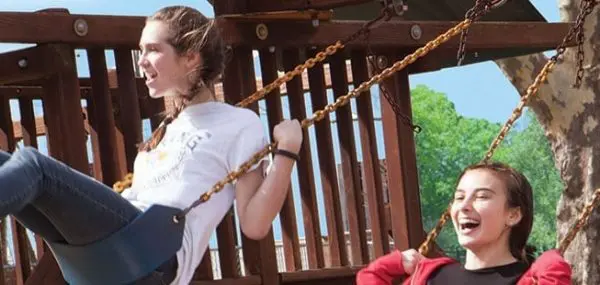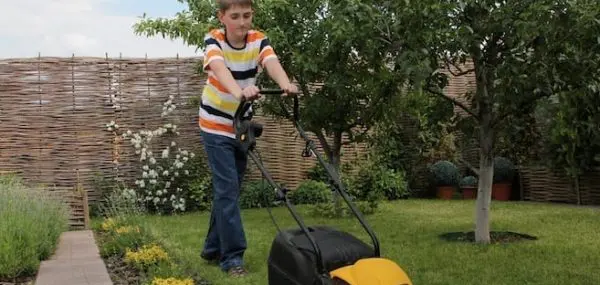Wake up late to the smell of breakfast. Sit with mom and eat eggs, toast, and a glass of milk. Throw on some clothes and run outside for a game of basketball. Grab a quick sandwich at home and run back out to go to the neighbor’s above-ground swimming pool for the next three hours. The dinner bell rings at 5:30 p.m. Such was summer for teenagers, circa 1976.
Fast forward to summer for teenagers now: The Unsupervised Summer.

For most, neighborhood friends are a thing of the past, and today’s June Cleaver works outside the home. These changes and more leave parents worried about the possible dangers of an unsupervised summer. Yet, the competing interests of parents and teens create a challenge. Teens are free from school and looking for carefree fun, while parents are concerned about the emotional and physical safety of their teens. The movie Juno sums up parents’ worries quite well: “Why are we having sex? Because we are bored.”
Parents recognize the value of summer vacation, especially after a school year filled with stress, heavy schedules, and sleep deprivation. Yet, adults don’t want their offspring sleeping until noon and then spending hours watching TV, plugging into Facebook, listening to the iPod or multitasking all three at the same time. Teens hanging out, unsupervised, at each other’s houses also doesn’t settle parental anxiety. It’s hard to find safe and healthy summer activities.
There are ways to resolve the conflict so that teens and parents can enjoy the summer.
How Summer for Teenagers Can Be Safe and Fun:
1. Assess your teen’s tendency toward risky behavior.
“Parents need to know how their teens assess risk,” says Dr. Lisa Damour, a clinical psychologist in private practice and author. “Kids who worry about getting caught tend to take greater risks. Those kids are likely to ask, ‘Can I get away with this?’ On the other hand, kids who consider the danger of their behavior are generally more cautious. Those kids ask, ‘If I do this, what can really happen?’ As the parent, your job is to assess whether your teen can fill free time constructively or whether you teen would benefit from more structure to keep them out of trouble.”
As you begin to plan the summer for your teenagers, Damour suggests that you clarify your role as the parent in helping your teens make wise decisions for how they spend their summer. This may result in your responding with the occasional, ‘No,’ which may lead to an angry teen.
2. Be willing to compromise.
Moreover, parents must remain open to compromise. Mack, from Davenport, Iowa, for example, wanted to paraglide down the Yukon Mountains for two weeks this summer. He hadn’t considered the cost, though, and his parents weren’t willing to fund the experience. They said no to the unaffordable trip, but they compromised and found a cheap(er) summer activity, a one-week teen adventure camp much closer to home.
3. Expect resistance.
Also, prepare for some resistance from your teen in the planning. Like many teens, Lee, from Norwalk, Connecticut, wants to do “absolutely nothing” for the entire summer. During the school year, Lee juggles five honor’s classes, church youth group and marching band. Summer for this teenager is her time to de-stress.
4. Promote Balance
While Damour understands that teens, like Lee, desire to do nothing during the summer, she believes that the best benefit comes from a summer for teenagers that balances scheduled activities and leisure. She encourages some structure in each day.
“Whether it is travel, volunteering or paid work, teens need to have somewhere to be each day in order to create some structure,” Damour says.
5. Find the right activities.
So how do parents balance their teens’ need for freedom and relaxation with safety and productivity? Seasoned parents suggest sitting down with your adolescents to plan an enjoyable, safe and somewhat active summer experience. Issues to tackle might include freedom versus responsibilities, boredom prevention, finding safe summer activities, and budgetary limitations and transportation options. But the possibilities are endless when it comes to planning summer for teenagers.
Summer can be a time for teens to pursue a passion. Sixteen-year-old Cole Lange, of New Jersey, loves biking and hopes to turn his passion into a career. He will spend the summer traveling from competition to competition. Cole’s parents are huge supporters and help me in any way they can.
“My dad used to race when he was younger, so it runs in the family,” Cole says. This summer, I’ll be competing in the A class, the second-fastest you can be without being pro.”
Summer work also serves many purposes. Dan Telljohann from Solon, Ohio, is responsible for his own spending money, so summer is a great time to earn good money. But, Dan doesn’t mind his work as a lifeguard; many of his teammates lifeguard with him.
“Completing my lifeguard certification was hard work and a big time commitment, but once I had certification, it was easy to get a job,” Dan says.
Max Kogan from South Euclid, Ohio, also decided to get a summer job and ended up at Wildwater Kingdom.
“I put on a suit, drove to the interview and got the job. I loved the job. Working at a water park was such a new experience, and it gave me a sense of independence and adulthood.”
For those with time and money, summer might be the time for travel. In the case of “Arianna,” last summer meant the trip of a lifetime as she journeyed from her adoptive home in New England to her birthplace in China.
“I was thrilled to see the country where I was born and learn about its great history,” she says.
6. Discuss expectations.
Still, worries don’t abate just because your teens are occupied, and the onset of summer sounds alarms to others than parents. Officer Todd Bennett, Orange School Resource Officer, says that police are on heightened alert once school lets out. They patrol places where kids want to trespass, like public and private pools, parks, schools and golf courses. They notice when a bunch of cars are parked on a street. And, they begin to receive increased noise complaints from neighbors about parties.
Nice weather combined with the freedom of summer leads to more risk taking, so parents should speak with their teens about how to handle those situations.
“Discuss etiquette with your teen,” Bennett says. “It is important to be polite to the police officer and own up to your behavior. If you are insolent, you will get in more trouble. Attitude really matters. Lastly, don’t ever run away. That will get you in much more trouble.”
Officer Bennett suggests other proactive measures that parents can institute to keep their teens away from trouble, including giving teens responsibility and setting boundaries, like reasonable curfews.
Once school lets out, hospital emergency rooms also experience a sharp increase in trauma-related injuries. Dr. Jerri Rose, a pediatric emergency medicine specialist and assistant professor of pediatrics at CWRU School of Medicine, reports that an unfortunate byproduct of summer for teenagers is a busier pediatric emergency room.
“In the summer, we see the volume of traumatic injuries increase. Many trauma-related injuries involve swimming and heat-related illnesses. Still, the most common cause of injury is vehicle-related: cars, motorized vehicles and lawnmowers,” Rose says. “Make sure your teen is ready to operate a vehicle without adult supervision.”
Parents also need to consider bacterial meningitis, which can affect teens who spend part of their summer living in close proximity with other teens at summer camps, college dorms and teen tours. For this, Rose advises parents to confirm with their pediatrician that the teen has received the Meningococcal vaccine.
Rose also recommends that parents re-visit the stranger-danger conversation. Predators can target teens with flattery, like: “You have a beautiful voice. I am an agent and I can make you famous. Come to my recording studio.” Or, they may try to seem caring and offer to help: “It is getting cold and dark. Let me drive you home.”
“Encourage your teen to role-play different responses like, ‘My mom doesn’t let me take rides from strangers,’” Rose says. “Also, talk about the need to choose safety over politeness. When your instinct tells you to be alarmed, don’t worry about being rude.”
That advice goes for parents too. If all else fails in your best-laid attempts to plan a perfect summer for your teen, Damour advises you to rely on your parental instincts. If your teen asks to do something that sets off alarms in your head, follow the advice you’d give your teen and just say no.

“The best gift you can give your kid is that they can blame all their good behavior on you,” Damour says.




